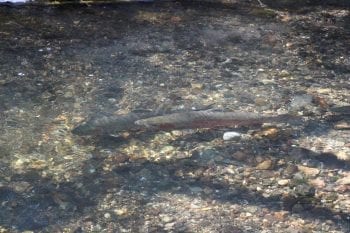Recovery efforts for Southern California steelhead
The LA Times published an op-ed by CalTrout’s South Coast Program Director, Dr. Sandra Jacobson, on the plight of Southern steelhead and the conservation projects that are happening right now to recover the population.
Locals who like to fish off the coast might be surprised to learn that Southern California steelhead were once prized catches along the coast. With dwindling population numbers, these fish are now federally endangered. Their struggle is symbolic of a larger challenge: maintaining healthy waterways for people and wildlife in urbanized coastal California. But real progress is being made toward recovering this iconic species. Recent efforts provide hope that these native fish can coexist with people, even in this highly altered landscape.
The elusive Southern California steelhead are an incredibly resilient species. Listed as federally endangered in 1997, they represent the southern edge of the steelhead species’ range. Their genetic diversity has, so far, enabled them to adapt to higher water temperatures (up to 77°F!), low streamflows, and weather variability. Southern steelhead are the fish of the future. Their amazing resiliency is a major reason why we need to protect this distinct species. Sustaining their genetic diversity is crucial as it may offer clues that could help other steelhead populations further north weather hotter water with a warming climate.
 Sandra leads the South Coast Steelhead Coalition which is charged with implementing the 2012 National Marine Fisheries Service Southern California steelhead recovery plan. We work with a broad range of Coalition partners– non-profits, government agencies, tribes, and interested stakeholders– to re-establish steelhead populations in high priority watersheds. Removing in-stream barriers is a key part of our steelhead recovery plan since fish passage among the complex array of concrete infrastructure is a major concern. CalTrout’s headwaters-to-ocean recovery approach will ensure the long-term persistence of self-sustaining wild populations of Southern steelhead.
Sandra leads the South Coast Steelhead Coalition which is charged with implementing the 2012 National Marine Fisheries Service Southern California steelhead recovery plan. We work with a broad range of Coalition partners– non-profits, government agencies, tribes, and interested stakeholders– to re-establish steelhead populations in high priority watersheds. Removing in-stream barriers is a key part of our steelhead recovery plan since fish passage among the complex array of concrete infrastructure is a major concern. CalTrout’s headwaters-to-ocean recovery approach will ensure the long-term persistence of self-sustaining wild populations of Southern steelhead.




